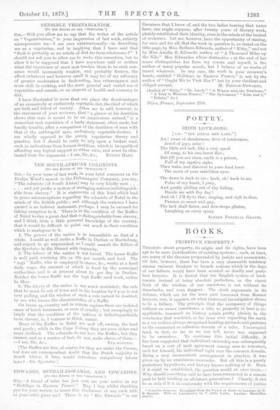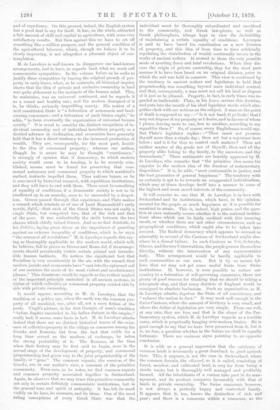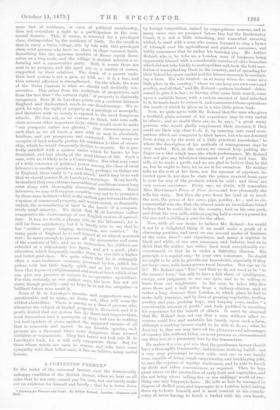BOOKS.
PRIMITIVE PROPERTY.*
THEORIES about property, its origin and its rights, have been apt to be mere justifications of existing systems ; such, at least, are many of the theories propounded by jurists and economists. Of late, however, there has been a very observable tendency among eminent thinkers to broach notions which in the days of our fathers would have been scouted as deadly and pesti- lent heresies. It is hinted that our English system of land- tenure, instead of being absolute perfection, as the ripest fruit of the wisdom of our ancestors, is not without its drawbacks, and even dangers. The stock arguments in its defence, which are fOr the most part borrowed from Roman lawyers, rest, it appears, on what historical investigation shows to be a fallacy. The principle that the occupancy of things without an owner constitutes a title to property in. land is in- applicable, inasmuch as history points pretty plainly to the conclusion that mankind, so far from ever regarding the earth as a res nullios, always recognised hunting-grounds and pastures as the communal or collective dotnaiu of a tribe. Unoccupied land, iu fact, as far as we can tell, never was supposed to be ownerless. To overcome this initial difficulty, it has been suggested that individual ownership was subsequently based on a sort of tacit agreement among men to renounce, each for himself, his individual right over the common domain. Being a very inconvenient arrangement in practice, it was given up by an unanimous surrender. But all this is a purely gratuitous hypothesis, and history knows nothing of it. Even if it could be established, the question would at once occur,— Why should something said to have been transacted in a remote past be held binding on all future generations P Clearly, it can be so only if it is iu conformity with the requirements of justice * Primitive Avert y. Translated from the French of Emile do Lavolayo, by G. M Marriott. With an Introduction by T. Cliffs Loll°. London: Macmillan and Co.
and of expediency. On. this ground, indeed, the English system has a good deal to say for itself. It has, on the whole, attracted a fair amount of skill and capital to agriculture, with some very satisfactory results. But then against this we have to set off something like a million paupers, and the general condition of the agricultural labourer, which, though we believe it to be slowly improving, is not altogether a pleasant object of con- templation.
M. de Laveleye is well known to disapprove our land-tenure arrangements, and to have, as regards land, what we must call communistic sympathies. In the volume before us he seeks to justify these sympathies by tracing the original growth of pro- perty in early times, when, as he contends, all historical inquiry shows that the idea of private and exclusive ownership in land was quite abhorrent to the instincts of the human mind. This, he maintains, was an universal sentiment, and he regards it as a sound and healthy one ; and the modern disregard of it is, he thinks, seriously imperilling society. His notion of a well constituted State is " a federation of autonomic and land- owning communes ; and a federation of such States ought," he adds, " to form eventually the organisation of universal human society." It is usual to consider the distinct recognition of in- dividual ownership and of individual hereditary property as a decided advance in civilisation, and economists have generally held that it has a direct tendency to the increased production of -wealth. They are, consequently, for the most part, hostile to the idea of communal property ; whereas our author, though he is aware he may be thought "reactionary," is strongly of opinion that if democracy, to which modern society would seem to be tending, is to be securely esta- blished, means must be found for preserving that com- munal autonomy and communal property to which mankind's earliest instincts impelled them. Thus nations began, so he is convinced by historical research, with republican institutions, and they will have to end with them. There must be something of equality of conditions, if a democratic society is not to be swallowed up in an anarchy, soon to be succeeded by a despot- ism. Greece passed through this• experience, and Plato makes a remark which reminds us of one of Lord Beaconsfield's early novels, Sybi,/,—that each of the Greek States was not really a single State, but comprised two, that of the rich and that of the poor. It was undoubtedly the strife between the two classes which chiefly ruined Greece. And so we find Aristotle, in his Politico, laying great stress on the importance of guarding . against an extreme inequality of conditions, which is, he says, "the source of all revolutions." M. de Laveleye regards this say- ing as thoroughly applicable to the modern world, which will, he believes, fall to pieces as Greece and Rome did, if its arrange. ments should persistently violate certain primal and ineradic- able human instincts. Ho notices the significant fact that Socialism is very considerably in the air, with the remark that modern jurists and economists have " cast into the upturned soil of our societies the seeds of its most violent and revolutionary phases." This disastrous result he regards as due to their neglect of the important principle embodied iu all ancient systems, in virtue of which collective or communal property existed side by side with private ownership.
It would appear, according to M. de Laveleye, that the tradition of a golden age, when the earth was the common pro- perty of all mankind, was, after all, not a mere fiction of the poets. Virgil's picture, in his first Georgic, of man's condition " before Jupiter succeeded to his father Saturn in the empire," really had, it seems, some basis iu fact. M. de Laveleye admits indeed that there are no distinct historical traces of the exist- ence of collective property in' the village or commune among the Greeks and Romans, but from the fact that cattle for a long time served as the medium of exchange, he infers the strong probability of it. The Romans, at the time when their history may be first said to begin, were in the second stage of the development of property, and communal proprietorship had given way to the joint proprietorship of the family, or " guns." The common repasts, the engrairroe, of the Greeks, are, in our author's view, a remnant of the primitive community. Even now, as he notes, we find common repasts and common property associated together in Switzerland. Again, he observes that we may trace this primitive community not only in certain definitely communistic institutions, but in the general tone and spirit of antiquity. It has left its mark visibly on its laws, its manners, and its ideas. One of the most ruling conceptions of every Greek State was that the individual must be thoroughly subordinated and sacrificed to the community, and Greek law-givers, as well as Greek philosophers, always kept in view the desirability of maintaining a certain equality of conditions. Lycurgus is said to have based his constitution on a new division of property, and this idea of from time to time artificially regulating the distribution of wealth continually recurs in the works of ancient writers: It seemed to them the only possible mode of averting fierce and fatal revolutions. When they dis- cuss the origin of private ownership, they for the most part assume it to have been based on an original division, prior to which the soil was held in common. This view is confirmed by the tendency in ancient writers and legislators to hold than proprietorship was something beyond mere individual control, and that, consequently, a man must not sell his land or dispose of it just as ho pleased. Property, in fact, in early times was re- garded as inalienable. Plato, in his Laws, revives this doctrine, and puts into the mouth of his ideal legislator words which alto- gether clash with our notions on the subject. A man on the point of death is supposed to say :—"Is it not hard, 0 ye Gods! that I may not dispose of my property as•I desire, and in favour of whom I please, leaving more to one, less to another, according to my regard for them P" So, of course, every Englishman would say.
But Plato's legislator replies Thou cant not promise thyself more than a single day ; thou art but a sojourner here below ; and is it for thee to control such matters P Thou art neither master of thy goods nor of thyself; thou and all thy property alike belong to thy family, to thy ancestors, and thy. descendants." These sentiments are heartily approved by M. de Laveleye, who remarks that "the primitive idea seems far superior to the modern idea of the freedom of testamentary disposition," It is, he adds, "most conformable to justice, and the best guarantee of general happiness." The tendency with us certainly is apt to be towards an exaggerated individualism, which may at times develope itself into a menace to some of the highest and most sacred interests of the community.
It will surprise no one that M. do Laveleye is in love with Switzerland and its institutions, which have, in his opinion, secured for the people as much happiness as it is possible for mankind to attain. This is, indeed, high praise, and the ques- tion at once naturally occurs whether it is the national institu- tions alone which can be fairly credited with this amazing. result, or whether there are not other circumstances, such as geographical conditions, which ought also to be taken into account. The Radical democracy which appears to succeed se admirably in several of the Cantons of Switzerland might else- where be a dismal failure. In such Cantons as Uri, Schwytz, Glarus, and the two Unterwaldeus, the people govern themselves. directly, without the intervention of any representative body. This arrangement would be hardly applicable to such communities as our own. But it by no means fol- lows that we may not get some useful hints from Swiss institutions. If, however, it were possible to reduce our country to a federation a self-governing communes, there are plenty of good reasons for thinking that we should be taking a. retrograde step, and that many districts of England would be consigned to absolute barbarism. Such an organisation, as M. de Laveleye admits, deprives the State of all consistency, and " reduces the nation to dust." It may work well enough in the Swiss Cantons, whore the amount of territory is very small, and where the duties of legislation aro very simple. From one evil, at any rate, they are free, and that is the abuse of the Par- liamentary system, which M. do Laveleye regards as a terrible curse, which is perpetually hanging over modern States. He is good enough to say that wo have been preserved from it, but it is, we fear, a.q.uestion whether in the future we shall be equally fortunate. There are ominous signs pointing to an opposite conclusion.
It is with us a general impression that the existence of common lands is necessarily a great drawback to good ngricul- ture. This, it appears, is not the case in Switzerland, where the common domain, the caltnend, as it is called, consisting of forest, meadow, and cultivated land, is very far from being a sterile waste, but is thoroughly well managed and profitably farmed. All the inhabitants of a, canton take part in its man- agement, and its produce compares favourably with that of lands in private ownership. The Swiss commune, however,. is not always a perfectly happy and contented family. It appears that it, too, knows the distinction of rich and poor ; and there is a commune within a commune, as the mere fact of residence, or even of political membership, does not constitute a right to a participation in the com- munal domain.. This, it seems, is reserved for a privileged class, distinguished by the accidents of birth. So the result is that in many a.Swiss village, side by side with this privileged class, exist persons who have no share in these common lands. Something like the agrarian troubles of Rome repeat them- selves on a tiny scale, and the village is divided between a re- forming and a conservative party. Still, it seems there are next to no paupers, and the aged are, as a matter of course, supported by their relatives. The death of a parent under their land system is not a gain, as with us ; it is a loss, and thus natural affection is strengthened. On the whole, the tone of the Swiss Cantons is what we should call decidedly con- servative. This arises from the multitude of proprietors, and from the fact that " the natural right " of property is distinctly recognised. Here M. de Laveleye points out a contrast between England and Switzerland, much to our disadvantage. We re- gard, he says, the right of property as a privilege or monopoly, and therefore with us society is exposed to the most dangerous attacks. Be does not, as we venture to think, take into suffi- cient account other important facts, which would seem to make "our prospects rather less gloomy." Our circumstances are such that, as we all know, a man with AS may be absolutely landless, and yet prosperous and contented. Even many an occupier of land actually prefers his condition to that of owner- ship, which he would frequently decline to acquire. He is per- fectly satisfied with a system under which he knows he has flourished, and had plenty of the good things of life. Such a man, with us, is likely to be a Conservative. But what may come of a wide extension of political power among the class of rural labourers is another question ; and here, perhaps, as things are in England, there really is " a rock ahead" and it may be as well that we should ponder M. de Laveleye's warnings. It can hardly be doubted that very extreme inequalities of condition cannot long exist along with thoroughly democratic institutions. Rural labourers, we may well suppose, would be very apt to be prompted by those same instincts which in the earliest ages led mankind into a system of communal property, and Would resent, as flagrantly unjust, the accumulation of land in the hands of a compara- tively small minority. We think that M. de Laveleye rather exaggerates the shortcomings of our English system of agricul- ture. It has, no doubt, a gloomy side, as the labourer's lot is still far from satisfactory, but it is hardly true to say that he
•
has "neither proper lodging, instruction, nor comfort." In many parts of England he is well housed at an almost nominal. rent ; he earns enough to procure all the necessaries and some of the comforts of life ; and as to instruction, his children'are schooled at a ridiculously low figure, and get a good, plain education, which frequently enables them to rise into a higher and better-paid class. We quite admit that he is unhappily often a semi-barbarous creature, governed by low, selfish im- pulses, with but little family spirit, and as yet far removed from that degree of enlightenment and mutual trust which alone can give any promise of success to co-operative agriculture. For this, certainly, as our author gays, the hour has not yet come, though possibly—and we lope he is not too sanguine—a brilliant future may await it.
Some of M. de Laveleye's theories and suggestions may be questionable, and to many, we doubt not, they will seem the wildest absurdities. There is among us a class of persons who, whenever the subject of landed property is discussed, and it is gently hinted that our system has its flaws and imperfections, work themselves into a paroxysm of fury, and can do nothing but hurl epithets of abuse against the supposed enemies of all that is venerable and sacred. In our humble opinion, such persons are a thousand times more dangerous than avowed socialists or communists. They had better not look into M. de Laveleye's book, for it will only exasperate them. But for those whose minds are open to reason, and who have some sympathy with their fellow-men, it has, we believe, many useful lessons.


































 Previous page
Previous page